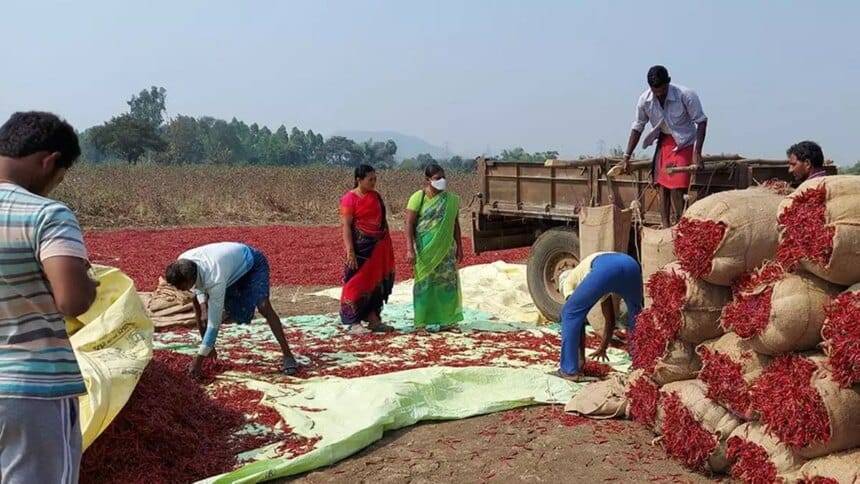Main Points In Hindi (मुख्य बातें – हिंदी में)
-
एफपीओ की भूमिका: किसान उत्पादक संगठन (एफपीओ) किसानों को सशक्त बनाने और ग्रामीण अर्थव्यवस्था के उत्थान में महत्वपूर्ण हैं। ये संगठन सामूहिक सौदेबाजी की शक्ति का उपयोग करके छोटे किसानों के सामने आने वाली प्रणालीगत असमानताओं को संबोधित करते हैं।
-
सशक्तिकरण के साधन: एफपीओ बेहतर बाजार उत्तोलन, संसाधन पहुंच और सामूहिक जोखिम-साझाकरण के माध्यम से किसानों को सशक्त बनाते हैं। उनकी सफलता इस बात पर निर्भर करती है कि वे कैसे व्यक्तिगत किसानों को मूल्य श्रृंखला में समान रूप से भाग लेने हेतु सशक्त बनाते हैं।
-
चुनौतियाँ: भारत में एफपीओ को विभिन्न चुनौतियों का सामना करना पड़ता है, जिसमें विश्वास और पारदर्शी शासन की कमी, उच्च प्रारंभिक लागत, सामाजिक विभाजन और ठहराव जैसी समस्याएं शामिल हैं। भरोसेमंद बाजार संबंधों की कमी भी एक बड़ी चुनौती है।
-
सामाजिक उद्यमों के साथ एकीकरण: एफपीओ को सामाजिक उद्यमों से जोड़ना एक स्थायी समाधान है। यह संबंध एफपीओ को विशेषज्ञता, नेटवर्क और बाजार पहुंच दिलाने के साथ-साथ विश्वसनीय आपूर्ति श्रृंखलाएँ बनाने में मदद करता है।
- व्यवहार्य मॉडल: सफल कार्यान्वयन के लिए सही भागीदारों की पहचान और साझा उद्देश्यों पर ध्यान देना आवश्यक है। कोलाबोरेशन के माध्यम से, एफपीओ को बाजार की गतिशीलता और संचालन प्रबंधन में प्रशिक्षित करके उन्हें दीर्घकालिक स्थिरता प्राप्त करने में मदद मिल सकती है।
Main Points In English(मुख्य बातें – अंग्रेज़ी में)
Here are the main points from the article on the sustainability of Farmer Producer Organizations (FPOs) and their integration with social enterprises:
-
Empowerment of Farmers: FPOs are vital in empowering farmers by enhancing market leverage, facilitating resource access, and enabling collective risk-sharing. Their true value lies in empowering individual farmers to participate equally in the value chain.
-
Challenges Facing FPOs: Despite their potential, FPOs in India face significant challenges, including lack of trust, transparency in governance, high initial costs, and social divides, which hinder farmer participation and cooperation.
-
Integration with Social Enterprises: Connecting FPOs with social enterprises can provide sustainable solutions by leveraging social enterprise expertise, networks, and market access. This partnership can create strong value chains and ensure reliable supply for both parties.
-
Practical Implementation Model: The success of integrating FPOs with social enterprises depends on identifying the right partners that share common goals, training FPO members in necessary market skills, and ensuring direct connections to buyers for stable demand.
- Overcoming Adoption Barriers: To implement this model effectively, barriers such as fostering inclusive participation, building trust, and addressing social divides through support from key institutions are essential for achieving rural prosperity and economic inclusion.


Complete News In Hindi(पूरी खबर – हिंदी में)
किसान उत्पादक संगठन (एफपीओ) किसानों को सशक्त बनाने और ग्रामीण अर्थव्यवस्था के उत्थान में महत्वपूर्ण हैं। संसाधनों को एकत्रित करके और सामूहिक सौदेबाजी की शक्ति बनाकर, एफपीओ प्रणालीगत असमानताओं को संबोधित करते हैं जो छोटे किसानों को नुकसान पहुंचाते हैं। हालाँकि, इन समूहों की सफलता उनके अस्तित्व से कहीं अधिक पर निर्भर करती है – यह टिकाऊ रणनीतियों पर निर्भर करती है जो यह सुनिश्चित करती है कि वे अपने सदस्यों को लगातार मूल्य प्रदान करें। बाजार से जुड़ा, स्केलेबल और किसान-केंद्रित पारिस्थितिकी तंत्र बनाने के लिए एफपीओ को सामाजिक उद्यमों से जोड़ना एक आशाजनक समाधान है। यह दृष्टिकोण ग्रामीण समृद्धि को आगे बढ़ाते हुए एफपीओ स्थिरता चुनौतियों का समाधान करता है।
सशक्तिकरण के साधन के रूप में एफपीओ
एफपीओ किसानों को बेहतर बाजार उत्तोलन, संसाधन पहुंच और सामूहिक जोखिम-साझाकरण की पेशकश करते हुए, खंडित और व्यक्तिगत संचालन की सीमाओं को दूर करने में सक्षम बनाता है। हालाँकि, उनका अंतिम मूल्य व्यक्तियों को सशक्त बनाने में निहित है। एफपीओ संक्रमणकालीन तंत्र हैं, जो तत्काल अंतराल को संबोधित करते हैं लेकिन व्यक्तिगत विकास और स्वतंत्रता का समर्थन करने के लिए विकसित होते हैं। उनकी सफलता इस बात से आंकी जाती है कि वे किस हद तक व्यक्तिगत किसानों को मूल्य श्रृंखला में समान रूप से भाग लेने के लिए सशक्त बनाते हैं।
एफपीओ को चुनौतियों का सामना करना पड़ता है
अपनी क्षमता के बावजूद, भारत में एफपीओ को अपने उद्देश्यों को प्राप्त करने में महत्वपूर्ण चुनौतियों का सामना करना पड़ा है। विश्वास और पारदर्शी शासन की कमी अक्सर किसानों की भागीदारी को रोकती है। किसान अक्सर अभिजात वर्ग के कब्जे के डर से एफपीओ में शामिल होने से झिझकते हैं, जहां प्रभावशाली सदस्य व्यक्तिगत लाभ के लिए निर्णय लेने पर हावी होते हैं। उच्च प्रारंभिक लागत और अनिश्चित लाभ किसानों को और अधिक हतोत्साहित करते हैं। सामाजिक कारक, जैसे सामूहिकता के साथ पिछले नकारात्मक अनुभव और जाति या वर्ग विभाजन भी सहयोग में बाधा डालते हैं। इसके अलावा, एफपीओ की स्थापना और कामकाज को चलाने के लिए एक प्रमुख व्यक्ति की अनुपस्थिति के परिणामस्वरूप अक्सर ठहराव होता है।
-
यह भी पढ़ें: गुजरात 25% किसानों के लिए किसान आईडी बनाने वाला पहला राज्य बन गया
शायद, सबसे बड़ी चुनौती भरोसेमंद बाजार संबंधों की कमी है, जिससे ग्राहकों की प्राथमिकताओं को समझना और मूल्य प्रस्तावों को स्पष्ट करना कठिन हो जाता है। भरोसेमंद बाजार संबंधों के बिना, यहां तक कि अच्छी तरह से काम करने वाले एफपीओ को भी स्थिरता के मुद्दों का सामना करना पड़ता है।
एफपीओ को सामाजिक उद्यमों से जोड़ना
एफपीओ को सामाजिक उद्यमों के साथ एकीकृत करना एक स्थायी समाधान प्रदान करता है। वित्तीय व्यवहार्यता और सामाजिक प्रभाव पर दोहरे फोकस से प्रेरित सामाजिक उद्यम, एफपीओ की कमी के कारण विशेषज्ञता, नेटवर्क और बाजार पहुंच प्रदान कर सकते हैं। बदले में, एफपीओ सार्थक प्रभाव पैदा करने के लिए सामाजिक उद्यमों के मिशन के साथ जुड़कर विश्वसनीय आपूर्ति श्रृंखला और ग्रामीण उत्पादकों से सीधा संबंध प्रदान करते हैं।
उदाहरण के लिए, सामाजिक उद्यम एफपीओ सदस्यों को उच्च मांग वाली फसलों की खेती करने और मूल्य संवर्धन के लिए प्रसंस्करण इकाइयां स्थापित करने के लिए प्रशिक्षित कर सकते हैं, जबकि एफपीओ स्थिर सामग्री आपूर्ति सुनिश्चित करते हैं। यह सहजीवी संबंध मजबूत मूल्य श्रृंखलाओं का निर्माण करता है जो दोनों पक्षों को लाभ पहुंचाता है और दीर्घकालिक स्थिरता प्रदान करता है।
सामाजिक उद्यमों के साथ सहयोग एफपीओ प्रशासन को भी मजबूत कर सकता है। सामाजिक उद्यमों द्वारा समर्थित पारदर्शी और लोकतांत्रिक प्रक्रियाएं, सदस्यों में विश्वास और जुड़ाव का निर्माण करती हैं। समूह-आधारित इनपुट समर्थन जैसी साझा प्रतिबद्धताएँ, सामूहिक जिम्मेदारी को और बढ़ाती हैं।
कार्यान्वयन के लिए एक व्यावहारिक मॉडल
इस एकीकरण की सफलता साझा उद्देश्यों और पूरक शक्तियों के आधार पर सही भागीदारों की पहचान पर निर्भर करती है। सामाजिक उद्यम एफपीओ सदस्यों को प्रतिस्पर्धी बाजारों में सफल होने के लिए आवश्यक कौशल में मदद करने के लिए बाजार की गतिशीलता, व्यवसाय योजना और परिचालन प्रबंधन में प्रशिक्षित कर सकते हैं।
सामाजिक उद्यम नेटवर्क के माध्यम से खरीदारों के साथ सीधे संपर्क की सुविधा एफपीओ उत्पादों की स्थिर मांग सुनिश्चित करती है। प्रौद्योगिकी बाजार बुद्धिमत्ता, मांग पूर्वानुमान और लेनदेन पारदर्शिता के माध्यम से इन संबंधों को बढ़ा सकती है।
-
यह भी पढ़ें: इस वित्तीय वर्ष में एफसीआई की पहली खुले बाजार गेहूं बिक्री में लगभग 100% उठान
जब वित्तीय स्थिरता की बात आती है, तो सब्सिडी-संचालित मॉडल से हटकर, एफपीओ को आत्मनिर्भर आय स्रोत बनाने पर ध्यान केंद्रित करना चाहिए। कमाई-आधारित मॉडल पूर्वानुमेयता प्रदान करते हैं और किसानों को परिणामों को नियंत्रित करने के लिए सशक्त बनाते हैं।
एक उल्लेखनीय उदाहरण इंस्टीट्यूट ऑफ रूरल मैनेजमेंट आनंद (आईआरएमए) का सामाजिक उद्यम इनक्यूबेटर, iSEED है। एफपीओ और सामाजिक उद्यमों के बीच साझेदारी को शामिल करके, iSEED ने एफपीओ को व्यवहार्य व्यावसायिक अवसरों की पहचान करने, बाजारों तक पहुंच बनाने और स्केलेबल मूल्य श्रृंखला बनाने में मदद की है जो दोनों पक्षों को लाभान्वित करती है।
गोद लेने में आने वाली बाधाओं पर काबू पाना
इस मॉडल को लागू करने के लिए प्रमुख बाधाओं को दूर करने की आवश्यकता है। पारदर्शी संचालन और दृश्यमान लाभों के माध्यम से किसानों के बीच समावेशी भागीदारी, नियमित संचार और विश्वास का निर्माण आवश्यक है। प्रतिनिधि एफपीओ को बढ़ावा देने के लिए कार्यक्रमों को हाशिये पर मौजूद समूहों को शामिल करना चाहिए और जाति या वर्ग विभाजन को संबोधित करना चाहिए। आईआरएमए, नाबार्ड और अन्य ग्रामीण विकास संगठन जैसे प्रमुख संस्थान इन प्रयासों को बढ़ाने के लिए आवश्यक विशेषज्ञता और संसाधन प्रदान कर सकते हैं।
निष्कर्षतः, एफपीओ को सामाजिक उद्यमों के साथ एकीकृत करना ग्रामीण समृद्धि के लिए एक स्थायी मार्ग प्रदान करता है। यह मॉडल व्यक्तिगत किसानों के लिए मूल्य सृजन करते हुए प्रणालीगत चुनौतियों का समाधान करता है। अंतिम लक्ष्य यह सुनिश्चित करना है कि एफपीओ न केवल जीवित रहें बल्कि फलें-फूलें, जिससे किसानों को मूल्य श्रृंखला में समान भागीदारी हासिल करने के लिए सशक्त बनाया जा सके। इस मॉडल की सफलता इसकी मापनीयता में निहित है। यह कार्यक्रम विभिन्न क्षेत्रों और सेक्टरों में सफल साझेदारियों को दोहराकर संपन्न एफपीओ का एक राष्ट्रव्यापी नेटवर्क बना सकता है। यह, बदले में, ग्रामीण विकास, गरीबी उन्मूलन और आर्थिक समावेशन के व्यापक लक्ष्यों में योगदान देता है।
प्रतीक मोदी बीएमएल मुंजाल विश्वविद्यालय के स्कूल ऑफ मैनेजमेंट में डीन हैं, और राकेश अरावतिया, वित्त के प्रोफेसर, इंस्टीट्यूट ऑफ रूरल मैनेजमेंट आनंद
Complete News In English(पूरी खबर – अंग्रेज़ी में)
Farmer Producer Organizations (FPOs) play a crucial role in empowering farmers and uplifting rural economies. By pooling resources and leveraging collective bargaining power, FPOs address systemic inequalities that negatively affect small farmers. However, their success goes beyond mere existence; it relies on sustainable strategies that ensure consistent value for their members. Connecting FPOs with social enterprises to create a market-linked, scalable, and farmer-centric ecosystem is a promising solution. This approach tackles the challenges of FPO sustainability while promoting rural prosperity.
Empowerment through FPOs
FPOs enable farmers to overcome the limitations of fragmented and individual operations by providing better market leverage, access to resources, and shared risk management. Their ultimate value lies in empowering individual farmers. FPOs serve as transitional mechanisms that address immediate gaps but also evolve to support individual growth and independence. Their success is measured by how well they enable farmers to participate equitably in the value chain.
Challenges Facing FPOs
Despite their potential, FPOs in India face significant challenges in achieving their objectives. A lack of trust and transparent governance often hinders farmer participation. Farmers may hesitate to join FPOs due to fears of elite capture, where influential members dominate decision-making for personal gain. High initial costs and uncertain benefits can further discourage participation. Social factors, like past negative experiences with cooperation and caste or class divisions, also impede collaboration. Additionally, the absence of a key individual to drive the establishment and functioning of FPOs often results in stagnation.
- Read more: Gujarat becomes the first state to create farmer IDs for 25% of farmers
Perhaps the biggest challenge is the lack of reliable market relationships, making it difficult to understand customer preferences and articulate value propositions. Without these relationships, even well-functioning FPOs face sustainability issues.
Connecting FPOs with Social Enterprises
Integrating FPOs with social enterprises offers a sustainable solution. Social enterprises focus on both financial viability and social impact, providing FPOs with expertise, networks, and market access that they often lack. In return, FPOs can connect meaningfully with social enterprises, helping create a reliable supply chain and direct relationships with rural producers.
For example, social enterprises can train FPO members to cultivate high-demand crops and establish processing units for value addition, while FPOs ensure a steady supply of materials. This symbiotic relationship builds robust value chains that benefit both parties and provide long-term sustainability.
Collaboration with social enterprises can also strengthen FPO governance. Transparent and democratic processes supported by social enterprises build trust and engagement among members. Group-based input support fosters collective responsibility.
A Practical Model for Implementation
The success of this integration hinges on identifying the right partners based on shared goals and complementary strengths. Social enterprises can train FPO members in market dynamics, business planning, and operational management, equipping them with essential skills to succeed in competitive markets.
Facilitating direct buyer connections through social enterprise networks ensures stable demand for FPO products. Technological solutions can enhance these relationships by providing market intelligence, demand forecasting, and transaction transparency.
- Read more: Nearly 100% of FCI’s initial open market wheat sale in this financial year
Regarding financial stability, FPOs should focus on creating self-sustaining income sources instead of depending on subsidy-driven models. Earnings-based models offer predictability and empower farmers to control their outcomes.
An excellent example is the social enterprise incubator, iSEED, from the Institute of Rural Management Anand (IRMA). By fostering partnerships between FPOs and social enterprises, iSEED has helped FPOs identify viable business opportunities, gain market access, and create scalable value chains that benefit both sides.
Overcoming Adoption Barriers
To implement this model, key barriers must be addressed. Inclusive participation among farmers is essential, achieved through transparent operations and visible benefits, regular communication, and trust-building. Programs promoting representative FPOs should include marginalized groups and tackle caste or class divisions. Key institutions like IRMA, NABARD, and other rural development organizations can provide the necessary expertise and resources to enhance these efforts.
In conclusion, connecting FPOs with social enterprises offers a sustainable pathway for rural prosperity. This model resolves systemic challenges while creating value for individual farmers. The ultimate goal is to ensure that FPOs not only survive but thrive, empowering farmers to achieve equitable participation in the value chain. The success of this model lies in its scalability, potentially creating a nationwide network of prosperous FPOs by replicating successful partnerships across different regions and sectors. Ultimately, this contributes to broader goals of rural development, poverty alleviation, and economic inclusion.
Pratik Modi is the Dean at BML Munjal University’s School of Management, and Rakesh Aravatia is a Professor of Finance at the Institute of Rural Management Anand.




